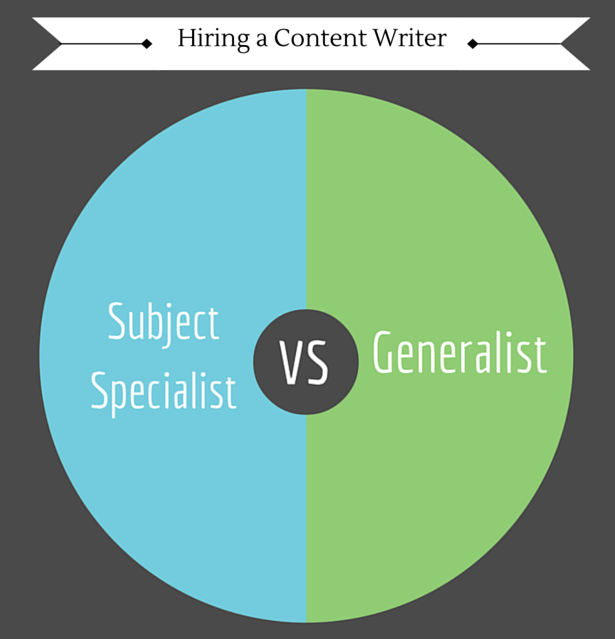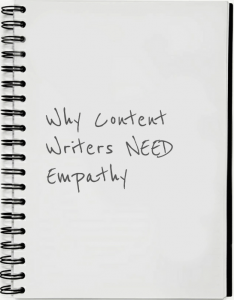Content marketing means creating content with a purpose. For every piece of  content you create, you should have a specific goal (or usually, several) in mind that you want it to achieve.
content you create, you should have a specific goal (or usually, several) in mind that you want it to achieve.
If you care at all about SEO – and I’m not sure I’ve met a content marketer that doesn’t – then one important goal you should have for blog posts is earning links. While the factors Google uses to determine search rankings are complicated, backlinks (quality ones, in particular) are still arguably the most important factor.
And one of the biggest factors involved in earning links is appealing to writers. We’re the ones who do most of that linking.
Let me assure you that we’re not spending our days considering whether or not we’ll make or break brands in our decisions about what to link to in our articles. We’re just trying to write the best, most useful content for our clients and their readers.
We’re not thinking about you, but you can benefit from thinking about us and understanding what goes through our heads when we decide whether or not a piece of content we come across is worthy of that link.
Just like anyone, we have our standards and pet peeves – sins that will make us immediately click off a page and refuse to consider it a worthy authority for our readers. To help you avoid inadvertently losing out on a link, I surveyed a few colleagues to better understand what makes all of us tick and decide a link is not worthy of our love.
8 Sins to Avoid if You Care About Building Links
1. A bad website design
If your website looks like it was built in 1999 and hasn’t had an update since, it won’t look authoritative to me (or any of your other visitors). I’m not the only one who feels this way, Content Strategist and Author Leah Levy told me “I wouldn’t link to a piece if the site looks spammy — that is, it has an outdated design.”
“Spammy” is about the last word you want people to use to describe your website or content. The quality of the content itself won’t matter much if it lives on a website that looks so cheap and old that no one can get past the design.
As Linda Dessau, the founder of Content Mastery Guide, put it “Since a link is an endorsement, I steer clear of sites that look outdated or unprofessional. I want to be associated with people and businesses that have a polished and professional image.”
2. Sloppy writing
Part of our job is paying attention to things like spelling, word choice, and sentence structure. When we encounter something that’s sloppily written or riddled with typos, you can bet we notice.
Linking to something that clearly no one bothered to proofread would make me look bad. If you can’t be bothered to take the time to read over your blog posts (or hire someone to do so) to make sure they make sense and don’t include any embarrassing errors, then writers won’t bother to share or link to them.
And it’s not just about writers nitpicking, sloppy writing makes you look untrustworthy. Leah agrees, she told me, “I wouldn’t link to anything with clear spelling or grammatical errors (nor would I trust it).”
3. Bad UX
A good website design isn’t just about making sure you don’t look stuck in the 90’s, you also want to make sure people find your site easy to navigate and pleasant to be on.
Unfortunately, many businesses are callously sacrificing good UX in attempts to get more email sign ups and clicks. Pretty much anyone you talk to will have their opinions on what makes for bad UX (although not everyone would know to call it that).
For me it includes pop ups that block out the text and blog posts split needlessly between several pages when they could all be on one (slideshow posts are notorious offenders). I’ll put up with a certain amount of that on sites that are established enough or if the content is really useful. Normally though, I click away and find something else.
Freelance writer Susan Johnston Taylor has her own list of UX dislikes: ““If a site is littered with Google ads, broken links or typos, it doesn’t seem very credible.
As does writer and editor Christine Moline of Jane Doe Ink, who told me, “I wouldn’t link to a poorly organized post or any pages cluttered with ads.”
Linda added a couple more issues to the list: “I screen for overly aggressive or annoying pop-ups, sites that are slow to load or aren’t mobile-friendly.”
All told, different descriptions of bad user experience accounted for the most common answer I received from writers.
Just to reiterate, the final list of UX issues that will make writers click away comes to:
- Annoying pop ups
- Articles split into too many pages
- Lots of ads
- Broken links
- Slow loading times
- Sites that aren’t mobile friendly
If you’re prioritizing getting email sign ups or ad money over the experience visitors will have on your website, know that may be costing you links.
4. Overly promotional content
When you’re paying for content (or investing a lot of time in it), it’s hard to set aside the idea of promoting yourself. I get it. You want a direct payoff for what you put into it.
When you make your content all about you though, it makes it come off as less trustworthy.
I head from multiple writers that overly promotional content was a no-no in their linking choices, but writer and content maven Phaedra Hise had the most to say on the subject: “I don’t link to anything that’s too promotional. I’m really picky about that – if it’s too promotional I might even link to it as an example of what NOT to do, but usually I don’t even like to give that kind of publicity.”
I mean, links are nice, but you don’t want to get one by becoming a writer’s example of what not to do.
5. A statistic without a link or citation
None of the other writers mentioned it, but this is one of my personal rules. If your article mentions a statistic without telling me where it’s from, you will immediately lose my trust.
The thing is, many of us think we know statistics we don’t. I’ve come across the same statistic casually mentioned in article after article that I’ve never been able to track down to a source.
Sometimes the source is a research report that costs hundreds of dollars, so I understand if not every statistic can be easily linked to. But make sure you let me know which report that costs hundreds of dollars it’s from so I’m willing to at least take your word that it’s real.
I can only speak for myself on this one, but if you ever want a link from me, make sure you cite your sources.
6. Outdated information
A lot of industries move fast. If your blog post from three years ago says something that’s no longer true, then it’s losing value in the link economy.
Says Susan, “If a post is several years old or clearly references outdated information, I’d try to find a more recent post to make sure I’m linking to something that’s still current.”
That doesn’t mean your old posts are useless, just that you should make a project out of updating them now and then. In particular, any posts you have that are popular and bringing in traffic now should be revisited so you can see if there’s a good opportunity to update any of them for accuracy.
7. Lack of authenticity
This relates somewhat back to overly promotional content, if you come off like you’re trying too hard or acting like something you’re not, people will notice.
Barry Feldman, founder of Feldman Creative put it at the top of his list of things he won’t link to: “Posts lacking personality. I think you can offer a lot of knowledge, but I’d rather not align my brand with yours if it’s boring. And that represents 90% of content marketers, sorry to say.“
The good news is that if 90% of marketers are doing it wrong, then bringing some real personality to your writing is a good way to differentiate yourself.
On a related note, Carol Tice, author of the recent ebook Small Blog Big Income and the blog Make a Living Writing , cited one of her biggest dealbreakers as when “the blog author is pretending to be an authority when they really just started doing the thing they write about.”
There’s a definite value to positioning yourself as a thought leader or expert – but only if you have the knowledge and experience to back it up.
8. Moral reputation
Carol had another big sin that she mentioned: “I won’t link to posts on the Huffington Post due to its policy of not paying writers, since I am an advocate for fair writer pay.”
She’s the only one of the writers I talked to that mentioned this particular point, but I suspect we’ve all shied away from visiting or linking to a website if we know the brand represents something we disagree with.
Be careful what you stand for and how you treat your employees and contractors. If you gain a reputation for being about something that many writers don’t agree with, they’ll be quick to find another resource to go with instead.
Conclusion
To summarize, the eight deadly sins that will lose you links are:
- An outdated website
- Sloppy writing and typos
- A bad user experience
- Being overly promotional
- Not citing your sources
- Letting your content become outdated
- Not being authentic
- A bad brand reputation
Avoiding these things obviously doesn’t guarantee you links. We’re still going to seek out the resources that are most valuable to our readers and relevant to the subject we’re talking about. That may be your links; it may be those of another business or publication. But if you’re guilty of one of these eight sins, then even if your content is useful, there’s a good chance we’ll look for another resource to use instead.
If you want to appeal to the people doing the writing, then take heed. Producing valuable content is one part of the puzzle, avoiding the errors on this list is another.




